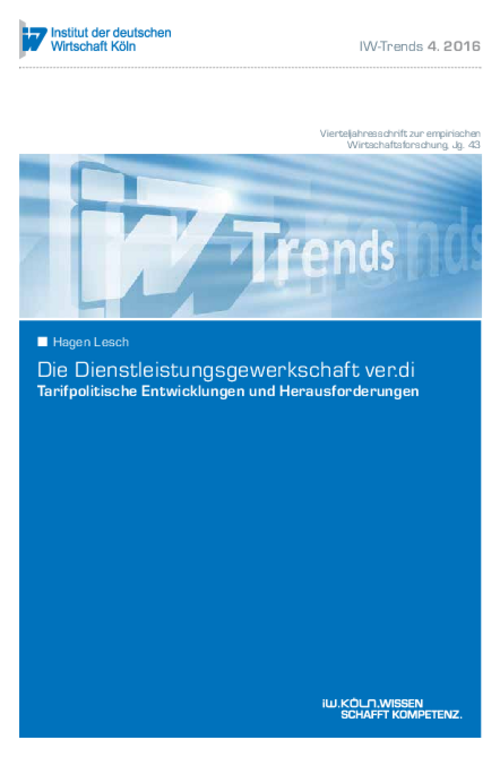In 2001 five trade unions merged to form the United Services Union, commonly referred to by its abbreviated German name: ver.di. Fifteen years after its foundation ver.di’s scorecard is rather mixed. Membership has fallen by 27 per cent and the number of companies bound by collective wage agreements has declined perceptibly in certain bargaining areas.

ver.di as a Wage Bargaining Partner: Developments and Challenges
IW-Trends

In 2001 five trade unions merged to form the United Services Union, commonly referred to by its abbreviated German name: ver.di. Fifteen years after its foundation ver.di’s scorecard is rather mixed. Membership has fallen by 27 per cent and the number of companies bound by collective wage agreements has declined perceptibly in certain bargaining areas.
For example, in the western German retail and wholesale trade the proportion of employees bound by union wage agreements has diminished from 69 per cent in 2000 to 42 per cent today. Moreover, the organisation has been put under pressure by the foundation of specialised unions and has increasingly faced demands from employers for changes to the general agreements on employment conditions. The union has responded with a more expansive wage policy accompanied by an increase in industrial action and has used the resulting conflicts to recruit new members. The decline in its membership has indeed slowed in recent years and in many bargaining areas the union has managed to catch up with the general development in wages.

Hagen Lesch: Die Dienstleistungsgewerkschaft ver.di - Tarifpolitische Entwicklungen und Herausforderungen
IW-Trends

More on the topic

German Wage Policy between Inflation and Stagnation: Are Conflicts with the Aims of Monetary Policy Looming?
After the economic and financial crisis of 2008/9, the German labour market soon began to recover, creating scope for a comparatively expansive wage policy.
IW
The Pros and Cons of Trade Union Membership
The decline in collective bargaining coverage in Germany is often attributed to the reluctance of companies to join an employers' association which negotiates collective agreements.
IW